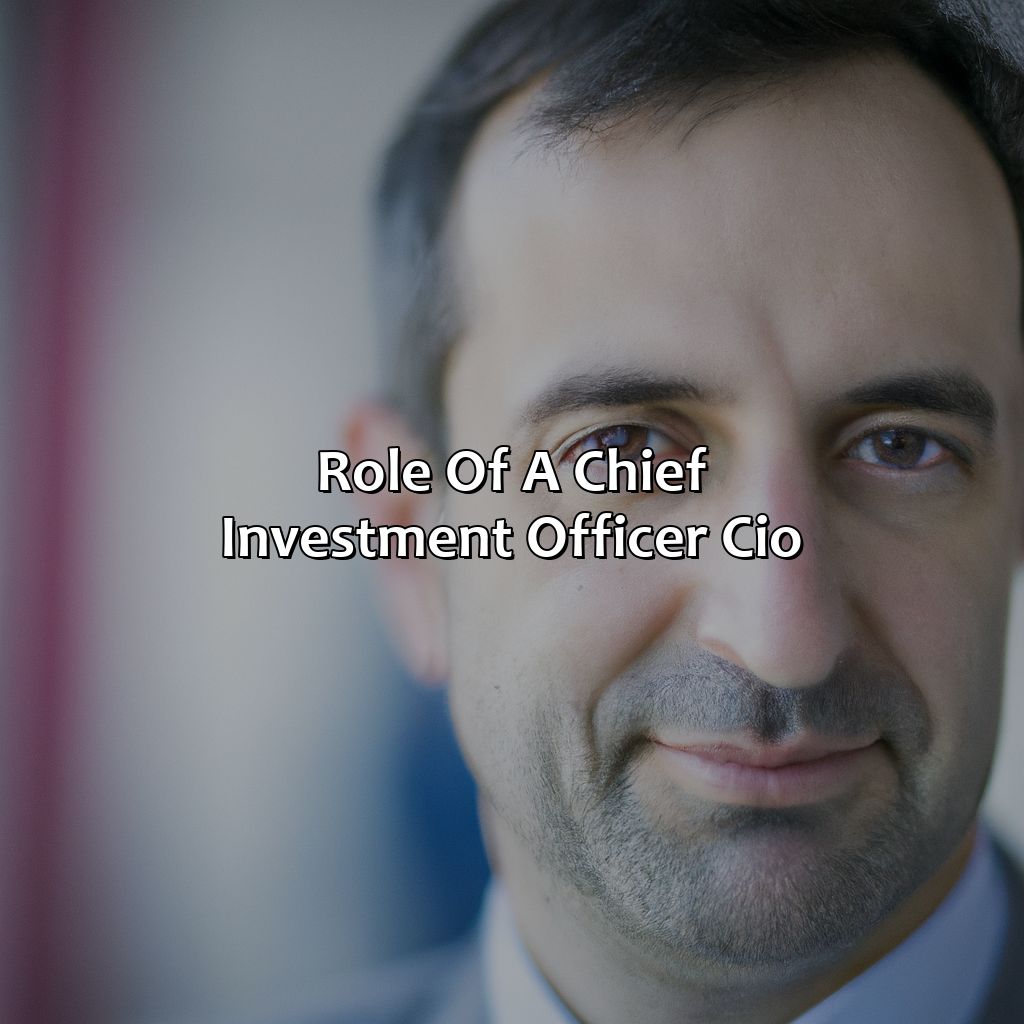What Does A Chief Investment Officer Do?
Key Takeaway:
- A Chief Investment Officer (CIO) is responsible for managing investment portfolios and developing investment strategies that align with the organization’s goals and objectives. This involves identifying investment opportunities, conducting market research, and assessing risk to ensure that investments provide optimal returns.
- A CIO must also ensure compliance with regulations and report to senior management and stakeholders on the performance of the organization’s investment portfolio. Effective communication, analytical skills, and critical thinking are essential for success in this role.
- To be qualified for a CIO position, candidates must have relevant education, experience in the finance industry, and strong leadership skills. CIOs must also possess analytical and critical thinking skills to assess risk and identify investment opportunities that align with the organization’s goals.
Are you struggling to understand the role of a chief investment officer? Discover the responsibilities a CIO handles and the qualifications required in this comprehensive guide. You will gain an insider’s perspective on the job.
Role of a Chief Investment Officer (CIO)
In the world of finance, the person in charge of managing investment portfolios and ensuring a company’s financial success is known as the Chief Investment Officer (CIO). The CIOs are responsible for maximizing returns while minimizing risks for institutional clients such as pension funds, insurance companies, and endowments. They develop long-term investment strategies, choose suitable asset classes, and oversee multiple investment managers. CIOs often work with a team of professionals, such as analysts and traders, to achieve their goals.
To be a successful CIO, individuals must have a broad knowledge of financial markets, keen analytical skills, and the ability to make strategic moves. They must also have excellent communication and leadership skills and be able to manage large teams of professionals. As the head of the investments, the CIO must ensure that the investment portfolio is aligned with the company’s goals and objectives, and that investment decisions are made in accordance with the company’s risk tolerance.
One of the key responsibilities of a CIO is to keep up with the ever-changing market conditions and being able to adapt the investment strategy accordingly. They continually monitor the performance of the investments and adjust the portfolio when necessary. CIOs are expected to stay on top of trends and emerging markets, and anticipate market risks, so they can plan and execute the appropriate investment strategy.
The first official CIO position was not created until the mid-20th century, when institutional investors started to realize the need for a professional to manage their investment portfolios. Today, the role of CIO has become critical for any organization with substantial financial assets that require careful management to secure the organization’s long-term financial success.
Image credits: retiregenz.com by Harry Duncun
Responsibilities of a Chief Investment Officer
As the leader of the investment team, a Chief Investment Officer (CIO) holds the responsibility of managing and directing the investments of an organization or individual. They analyze market trends and risks, identify investment opportunities, and develop effective strategies to achieve investment goals. The CIO focuses on assessing the financial health of an organization and formulating suitable investment plans aligned with its objectives to maximize profitability. They also oversee the portfolio performance and ensure compliance with regulatory requirements and ethical principles.
In addition to overseeing the investment process, the CIO stays up-to-date with market trends and economic conditions to create diversification strategies and make informed decisions. They work closely with other stakeholders to ensure proper risk management procedures are in place and held to standard. They also develop partnerships and relationships to gather data and resources that can improve investment decisions. It’s relevant to note that the CIO holds a significant level of responsibility and accountability, and must exhibit strong leadership, analytical skills, ethics, and industry knowledge to successfully fulfill their duties.
A true fact about a CIO’s role in a large organization; according to Forbes, the average CIO in a company with revenue above $1 billion earns a salary of $488,000 per year.

Image credits: retiregenz.com by Adam Duncun
Required qualifications and skills of a Chief Investment Officer
A Chief Investment Officer (CIO) needs diverse experience and skills to excel. They must hold professional finance-related qualifications, such as CFA, MBA, and possess excellent analytical and risk management skills. CIOs must have a strategic mindset, aptitude for effective decision-making, and a deep understanding of market dynamics to thrive in this role.
Furthermore, successful CIOs embrace diversity, understand the importance of team collaboration, and possess excellent communication skills to work with stakeholders. They also lead investment policies and strategies, assure optimal performance of the portfolio, and identify new investment opportunities.
One important aspect of being a CIO is keeping up with market trends, staying updated with regulatory changes, and leveraging emerging technologies to make informed decisions. Understanding macroeconomic factors and building relationships with external stakeholders fosters the growth of portfolios.
Pro Tip: The CIO’s ability to identify unique investment opportunities along with formal qualifications and exceptional communication skills is key to a successful career.

Image credits: retiregenz.com by Joel Duncun
Five Facts About What A Chief Investment Officer Does:
- ✅ A chief investment officer is responsible for overseeing the investment strategies and portfolios of an organization, such as a bank or investment firm. (Source: Investopedia)
- ✅ A CIO is typically responsible for managing risk, making investment decisions, and determining the allocation of assets. (Source: The Balance)
- ✅ The role of a CIO requires significant financial expertise and experience in investment management. (Source: Career Explorer)
- ✅ CIOs must stay up to date on market trends and economic conditions to make informed investment decisions. (Source: Wall Street Journal)
- ✅ The compensation for a CIO can range from hundreds of thousands of dollars to millions of dollars per year. (Source: Glassdoor)
FAQs about What Does A Chief Investment Officer Do?
What does a Chief Investment Officer do?
A Chief Investment Officer (CIO) is responsible for overseeing and managing the investment activities of an organization. They are responsible for developing investment strategies, assessing investment risk, and maximizing investment returns.
What are the primary responsibilities of a Chief Investment Officer?
The primary responsibilities of a Chief Investment Officer include developing investment strategies, managing investment portfolios, evaluating financial risks, and monitoring economic trends. The CIO is also responsible for ensuring that the organization’s investment strategy aligns with its overall business objectives.
What skills does a Chief Investment Officer need?
A successful Chief Investment Officer needs to have excellent analytical, communication, and leadership skills. They should have a strong understanding of financial markets, investment vehicles, and financial analysis techniques. Additionally, they need to be able to develop and implement effective investment strategies and manage investment portfolios in a constantly changing market environment.
What qualifications does a Chief Investment Officer need?
To become a Chief Investment Officer, a candidate typically needs a minimum of a bachelor’s degree in finance, economics, accounting, or a related field. Many CIOs also hold advanced degrees in business administration or finance. Professional certifications, such as Chartered Financial Analyst (CFA) or Certified Financial Planner (CFP), are also preferred.
What challenges do Chief Investment Officers face?
Chief Investment Officers face a variety of challenges, including economic volatility, regulatory changes, and technological disruptions, which can impact investment performance. Additionally, managing differing investment expectations from stakeholders and keeping up with market trends while mitigating risks can be overwhelming.
What are the career prospects for Chief Investment Officers?
The career prospects for Chief Investment Officers are generally positive due to the high demand for skilled investment professionals. The job outlook is further brightened by the growing complexity of investment markets that require higher-level investment expertise. High compensation packages are also expected for senior CIOs in well-performing organizations.
